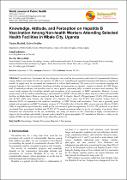Knowledge, Attitude, and Perception on Hepatitis B Vaccination Among Non-health Workers Attending Selected Health Facilities in Mbale City, Uganda
Abstract
Introduction
Vaccination has for a long time been used for the prevention and control of communicable diseases among children and adults. For the vaccination to be effective in controlling the spread of communicable diseases a significant number of people must be vaccinated and immunized to achieve herd immunity. The success of a vaccination campaign and program depends on the communities' knowledge attitudes and perceptions on vaccines. Uganda is endemic for HBV disease
with 10 national prevalence, and therefore needs to have a general community fully vaccinated to achieve herd immunity.
The current study assessed the knowledge attitude and perceptions of the community on HBV vaccination. Methods: A cross-
section study will be used by administering a questionnaire to all OPD clients who are above 18years at three selected health
facilities in Mbale district. Data was analyzed using Stata SE/14. Results: Out of 1020 participants 51.86% (530) were males
and 48.14% (492) were females, the majority were between 18-35 years and 35.49% had minimal tertiary level of
education.58.8% of respondents had moderate knowledge on HBV disease and vaccination. There was a generally good
attitude and perceptions on HBV Vaccination however 62.23% (636) believed that the HBV vaccine was not effective.29.68%
(304) of respondents agreed that they would go for vaccination if given an opportunity 56.33% (579) preferred to get them
vaccinated from government facilities and 75.53% (772) would recommend others to go for vaccination. Conclusion: More
Education and sensitization on the use, availability, and safety of vaccines to the community is highly recommended to
improve the knowledge and attitude; Opinion leaders should be given appropriate IEC materials on Vaccines; a study on the
uptake of HBV vaccine and associated factors should be carried
Collections
- Research Papers [57]

